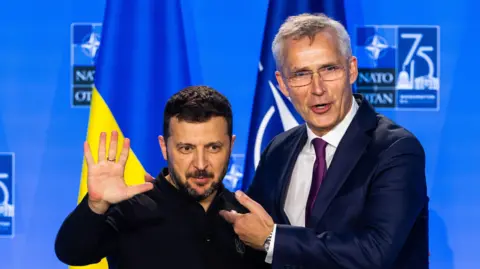 EPA
EPAEurope must be prepared for a decade of Ukranian war, the outgoing secretary general of Nato has warned.
Speaking to the BBC, Jens Stoltenberg said the “paradox” of the war in Ukraine is the longer the western military alliance commits to fighting the war, the faster a resolution will be reached.
Russian President Vladimir Putin launched a full-scale invasion of Ukraine in February 2022.
Mr Stoltenberg, who ends his 10-year tenure as secretary general in October, urged European Nato members to boost their commitments amid fears that US funds could be slashed or even stopped if Donald Trump wins a second term as US president in November’s election.
Asked if Nato allies had to be prepared for the conflict in Ukraine going on for more than 10 years, Mr Stoltenberg said: “Yes.”
He added: “But the main message is that the stronger the support for Ukraine and the longer we are willing to commit, the sooner this war can end.
“The paradox is that now President Putin believes that he can wait us out. So therefore, the war continues.
“When we communicate very clearly that we are here for long haul, that we have strong enduring support for Ukraine, then we have the conditions for a solution where Ukraine prevails as a sovereign independent state.”
It comes as Nato announced a command unit to coordinate support for Ukraine will be operational in Germany from September.
“This will provide more predictability and accountability and support and it will also demonstrate our enduring commitment to support Ukraine,” Mr Stoltenberg said.
“The time to stand up for freedom and democracy is now and the place is Ukraine.”
Mr Stoltenberg’s comments come as Germany announced it was planning to nearly halve military aid for Ukraine next year – from around £6.7bn (€8bn; $8.7bn) to around £3.4bn.
Finance Minister Christian Lindner said Ukraine’s financing was “secure for the foreseeable future” due to a G7 group of rich nations scheme to raise $50bn from interest on frozen Russian assets.
The planned aid cut comes amid fears in Ukraine and among its European allies that US funding could dry up during a potential second Trump White House.
This week former US President Trump chose JD Vance, one of the most isolationist members of the Republican Party, as his running mate.
The Ohio senator has previously said: “I don’t really care what happens to Ukraine one way or another.”
A vocal critic of US aid to Ukraine, he told this year’s Munich Security Conference that Europe should wake up to the US having to “pivot” its focus to East Asia.
Mr Stoltenberg said he was confident that the US would remain in the alliance because “it’s in the US security interest to have a strong Nato”.
There is also a “strong bipartisan support for Nato in United States, both in the Congress, but also in the opinion polls”, he argued.
Asked whether a second Trump term could mean less funding for Nato, Mr Stoltenberg said: “The right thing to do regardless of what you think about the US commitment to Nato is to invest more in our defence.
“First of all, it increases the likelihood that the US will stay a strong ally.
“Second, if something really bad does happen then it is good we have stronger European and Canadian defence capabilities.”
Mr Stoltenberg said the ex-US president made “absolutely right and valid criticisms” of European allies for not spending enough on defence and relying too much on the US.
But “this has now changed”, he added.
Nato members of the military alliance pledged to spend at least 2% of the value of their economies – measured by GDP – on defence per year by 2024.
The UK is one of the 23 of Nato’s 32 members to achieve the target this year – spending 2.3% of GDP on defence.
Mr Stoltenberg said: “Nato is the most successful alliance in history because, despite our differences, we have always been able to unite around our core values: to protect and defend each other.
“I expect that to be the case after the US elections.”



